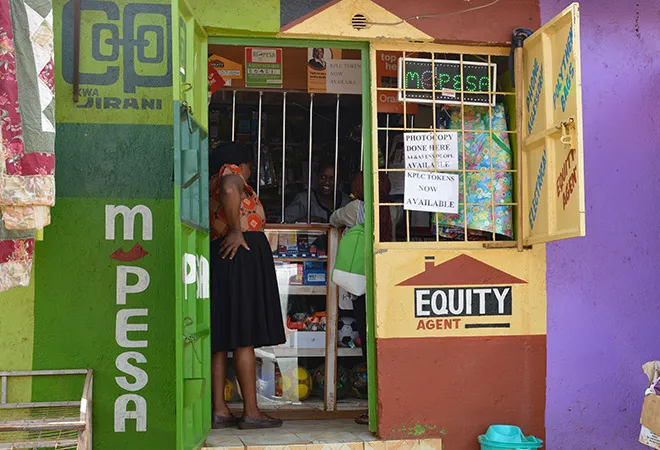
The Kenya‒based M‒Pesa mobile transfer money platform has had a disruptive effect on the economy. M‒Pesa has revolutionised commerce in Kenya, and by extension East Africa. The level of its integration into the economy is not only unprecedented — but also transformative. However, on closer examination, M‒Pesa and mobile money transfers also raise questions about the impact of these technologies on societies at large, and whether societies are able to harness the benefits of the digital revolution while minimising its side effects.
M‒Pesa reveals the need for data privacy in the transient space between analog and digital data collection. While M‒Pesa has been lauded for introducing banking services to the poor, it can simultaneously be used to identify undiscerning users, and leaves them vulnerable to identity theft and fraud. The information from transactions with M‒Pesa agents is usually stored in written and unsecured copies of spreadsheets, and in most cases, it is unclear how this data is treated, and whether it is returned to the service provider. The integration of M‒Pesa services into most payment systems for businesses also provides a minefield of data to businesses with undefined rules around the use of customer data. It is often unclear what the physical copy of the data is used for after transactions have been concluded. There have been numerous reported cases of M‒Pesa book registers being mined for unethical practices such as extortion and identity theft, and even cases where unscrupulous political parties have unwittingly used this data to register mobile subscribers as members or voters.
While M‒Pesa has been lauded for introducing banking services to the poor, it can simultaneously be used to identify undiscerning users, and leaves them vulnerable to identity theft and fraud.
While M‒Pesa has significantly reduced the need for paper money and mitigated some of the risk to consumers, it has simultaneously introduced and amplified a variety of security risks. There are a growing number of risks to agents who handle cash deposits to make transactions viable, and an increase in the number of shockingly violent burglaries targeting M‒Pesa agents. New forms of cyber crime and fraud using M‒Pesa have also emerged, as fraudsters and conmen have devised innovative scams to target unsuspecting subscribers. M‒Pesa has also provided money launderers and terrorist groups a convenient platform to move undetected assets; this could have potentially devastating consequences, and resulted in the terrorist attacks on Riverside Park in Nairobi.
We must also examine the cultural effects that M‒Pesa had: these are both positive and disruptive. More rural women — than ever — are now able to bank and access credit facilities securely reducing the gender equality gap. Thanks to M‒Pesa, more income is being reallocated to micro‒enterprises that has increased access to credit facilities for small and medium enterprises. Small and medium enterprises have also been able to adapt and streamline business models in ways that had previously not been possible, due to the convenience of mobile money. This has reduced the overhead demands of handling cash and the associated security and access risks. It is now possible to virtually trade round the clock in most, if not all, towns in Kenya. This pushes the region closer to the aspiration of a 24 hour economy. However, M‒Pesa has also increased debt in many households because of its credit and lending services, which have in turn distorted consumption priorities. Many subscribers are already in perpetual debt to services such as M‒Shwari and Fuliza, both of which offer credit facilities at comparatively higher interest rates. This is proven by the fact that Kenyans borrowed an estimated 45 billion through a credit facility Fuliza within the first three months of the launch of the service on M‒Pesa. While this has the potential to accelerate economic activity, such convenience can also result in an increased impulse spending for many households without proper financial literacy. It can also exacerbate socio‒economic and mental problems such as the alarming increase in betting‒related suicides as betting platforms are heavily reliant on M‒Pesa.
As the M‒Pesa phenomenon integrates itself into the economies of East and Central Africa, the region should prepare for both benefits and disruptions it can bring. Even as the benefits of the digital revolution are harnessed, they need to be matched with strategies to ensure that any adverse consequences are mapped and mitigate. This includes enforcement of robust data protection regulations covering the transient space between the analog and the digital, as well as incorporation of digital financial literacy in education to create more conscious consumers. The solutions to these challenges can only be addressed through a multi‒stakeholder approach.
The views expressed above belong to the author(s). ORF research and analyses now available on Telegram! Click here to access our curated content — blogs, longforms and interviews.




 PREV
PREV

